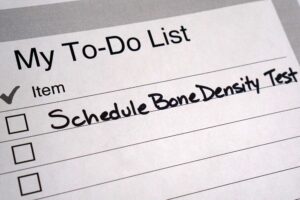Wondering if you need a bone density test? For the most part, if your physician has ordered one or recommended one, then yes. It means there are risk factors that can contribute to issues surrounding the strength of your bones. If your physician has not recommended it, or not ordered it yet, what follows are some reasons you should consider getting one.
What’s the Point?
A bone density test will measure how strong your bones are. Even if you haven’t broken a bone since childhood, there are certain criteria which would point to getting one. It will help your doctor find out if you have osteoporosis or are developing weak bones.
It will tell you if there is a risk of breaking a bone now or in the future. Also known as a bone mineral density test, it is recommended under certain circumstances. If you have already been diagnosed with osteoporosis, it will tell your physician how well treatments are working.
What Is Osteoporosis?
Osteoporosis is a bone disease that increases your risk of fractures. Weaker bones are more likely to break especially the hips, spine, and wrist.
There are no symptoms, so you won’t know you have it until you break a bone.
Who Is Considered at Risk for Weak Bones?
If you have any of these risk factors, talk with your physician about bone density screening. Once you have your first test, your results will determine how frequently you will need another.
Women Over the Age of 65
Women are at an increased risk for osteoporosis as they age.
Men should also have a bone density test as they get older, and it is recommended for men at age 70.
Those With Hormonal Imbalances
Hormone imbalances can affect both men and women. When a woman goes through menopause and loses estrogen, bones can become weaker. When undergoing cancer treatments for prostate cancer, testosterone levels are lowered and this weakens bones.
Losing Height
Becoming shorter means something. If you lose an inch and a half in height, this indicates your spine is getting shorter and weaker. It may also mean you are having compression fractures in your spine.
A Recent Fracture
If you have experienced a fracture in the recent past, this may indicate weakened bones and osteoporosis.
Other risk factors include the following:
- Smoking and consuming too much alcohol
- Not getting enough Vitamin D or calcium
- Taking certain medications
- Not getting enough physical activity
- Low body weight
- Having a parent who had osteoporosis.
Finding out if you have osteoporosis in its early stages increases your odds for a longer life and without fractures to slow you down.
Request a Bone Density Testing Appointment
Contact Atlanta Women’s Obstetrics & Gynecology at (404) 352-3616 if you are ready for a bone density test in Atlanta, GA.
